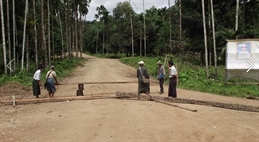
Regional governments lend support despite NGO opposition.
Myanmar is preparing to grant the first concession for the Dawei Port and Special Economic Zone (DSEZ) in the southern part of the country.
The announcement is backed by broad international government support and supplemented by other ports being built in Myanmar and Thailand, but is likely to be challenged by active non-governmental organizations and tenuous political situations in the two countries.
The concession is for the first 27 square kilometres of the project, and is expected to be issued in November, sources including Thailand’s military leader and prime minister General Prayuth Chan-ocha have said.
“But [the concession granting] is another matter, one that concerns investors,” Prayuth said.
DSEZ will ultimately include a deepwater port, an industrial estate with water and power supplies and road and rail links to neighbouring Thailand. Initial enthusiasm in Thailand’s private sector faltered and, late last year the project was transferred to a Special Purpose Vehicle jointly owned by the Thai and Myanmar governments.
That has not stopped Italian-Thai Development (ITD), which kickstarted the project in 2008, and Rojana Industrial Park from proposing to develop a road linking the Thai border with the Dawei project.
What gives these plans resonance is the backing they get from the Thai and Myanmar – and possibly other – governments.
One potential supporter is Japan, and with it comes the possibility of aid. “We would like to see the Dawei project advance in cooperation with Thailand and Myanmar,” Japan’s vice foreign minister Minoru Kiuchi said during a recent visit to Thailand.
Another is known to be India – important players as it starts to implement its ‘Look East’ policy. Prayuth met Indian Deputy Foreign Secretary Vijay Kumar Singh at the recent Asia-Europe Meeting (ASEM) summit in Milan, where the idea was pushed.
“The Thai Prime Minister also invited India to take part in Dawei Special Economic Zone which would greatly yield benefits to people throughout the region,” the Thai government reported on its website.
The DSEZ will be complemented by an Asian highway linking Thailand to India via Myanmar, scheduled to be completed in 2016, the government said.
Not everybody supports development of Dawei. An alliance of NGOs has been particularly outspoken, declaring that the Dawei project should be stopped so that the problems of early development can be dealt with.
“These problems need to be resolved first, before considering a new phase to this already problematic project,” the group said in Bangkok on October 21. Among the problems it sees are land seizures, enforced relocations and environmental degradation.
One particular bugbear the alliance underscored has been that development has been done ahead of Myanmar having an environmental law in place.
What also needs to be understood is the fragility of the region which will link Dawei with Thailand. Karen separatists, some armed, are active in the area, a reminder that Myanmar, while opening up at a steady clip, is not as stable as could be.
Thailand, too, has a problem with stability. Prayuth came to power in a coup in May. If he does not restore democracy by the end of next year as he says he will, 2016 might be a crunch year for both Prayuth and Dawei.
The issue could flare before that, though, as Dawei is set to become a focus for the National Human Rights Commission of Thailand, commissioner Nirun Pitakwatchara said. The move could force a re-examination of the project and strengthen the hand of those who are working against it.
“Dawei is a case where there are human rights violations which are cross-border,” said Pitakwatchara through an interpreter. “It is a Thai government project and it is being implemented by a Thai company,” he added later, in explaining why the commission was getting involved.
By Michael Mackey
Southeast Asia Correspondent | Bangkok



